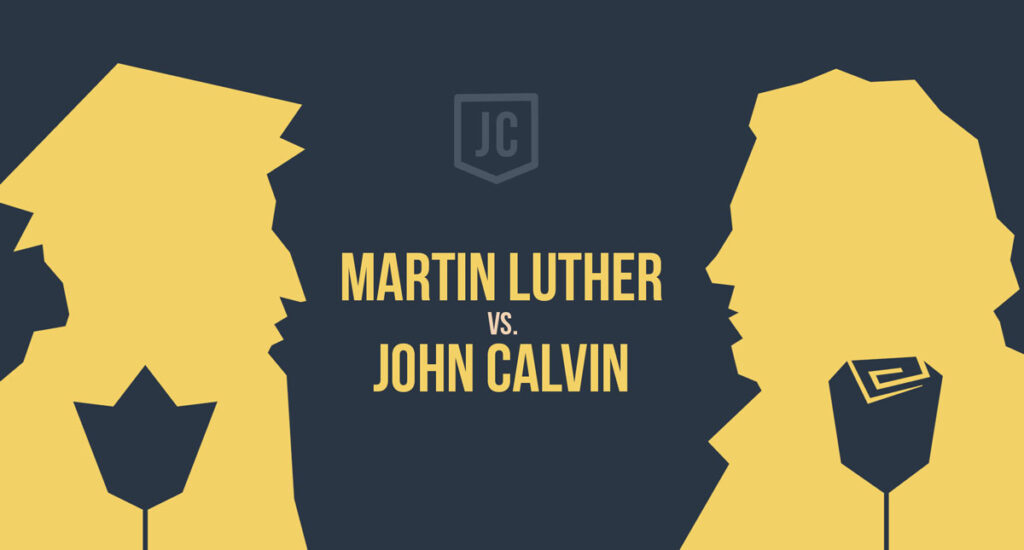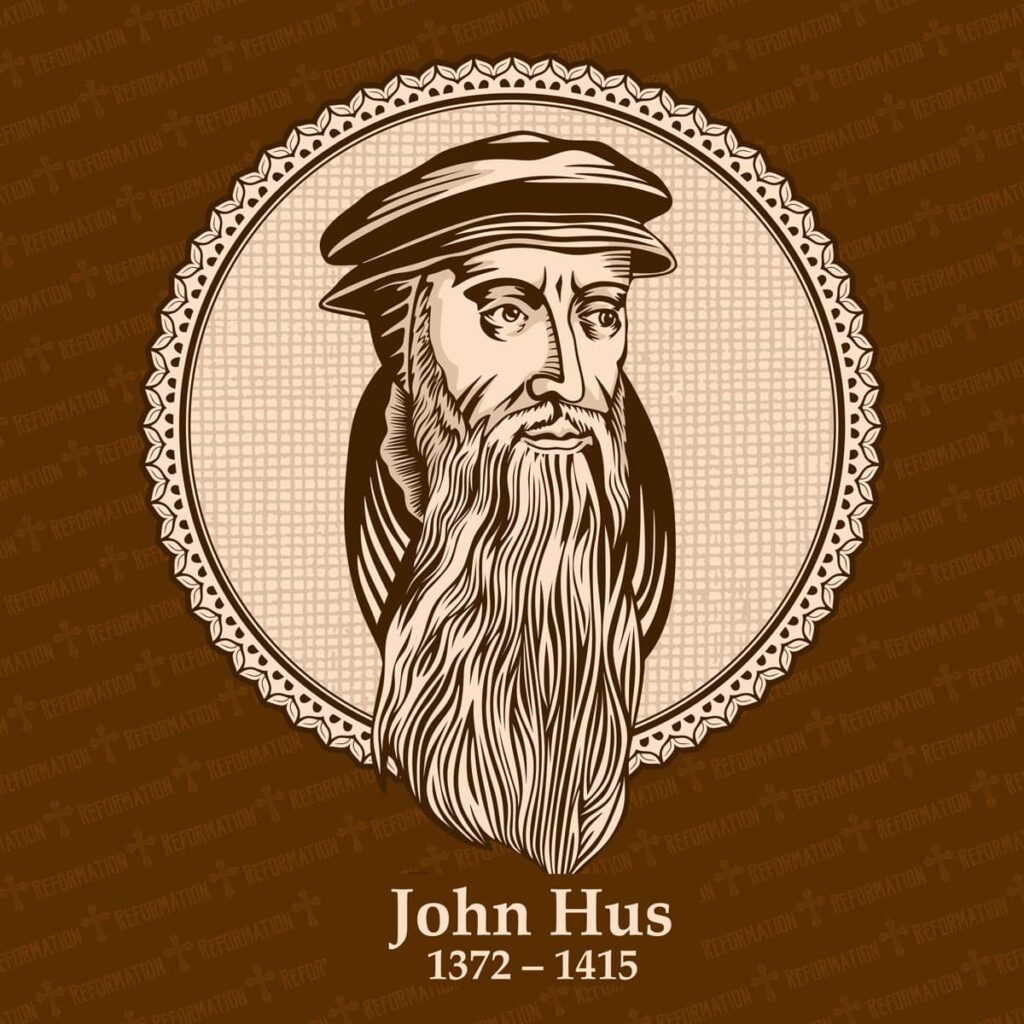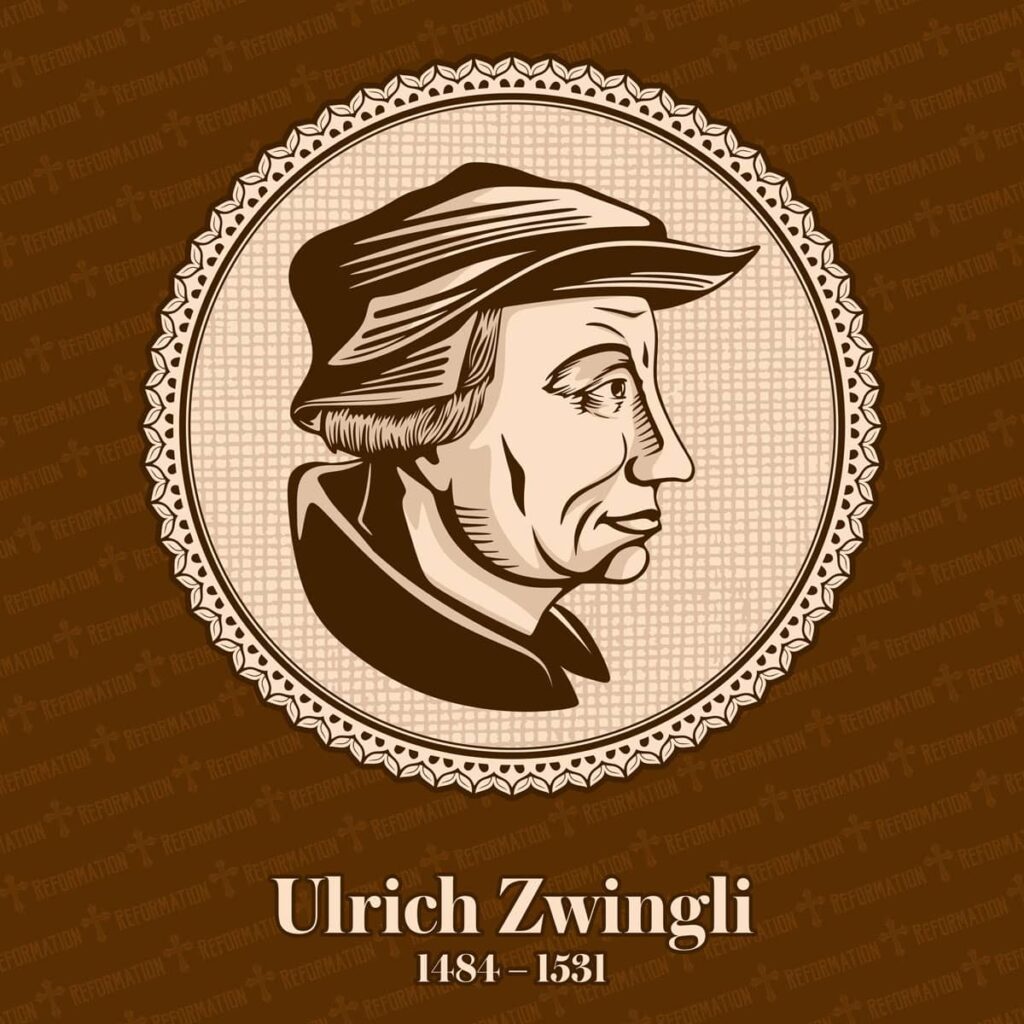Martin Luther, John Calvin, & the People Who Influenced Their Theology
The online search phrase “Martin Luther vs. John Calvin” is made hundreds of times a month by those discovering the richness of church history for the first time, and rightly so. No religious reformers influenced the world more than these two Titans of Christianity. Though the Protestant Reformation passed the five-hundred-year milestone in 2017, the air is still abuzz with the sound of their voices. Whether you realize it or not, the world as you know it today was directly shaped by the words and actions of these two men.

The legacy of these two men would be incorrectly framed as a debate: Martin Luther vs. John Calvin. Instead, they should be viewed as natural extensions of each other. Martin Luther was a first-generation reformer in 1517, whereas John Calvin, a second-generation reformer, wasn’t even born until 1509. John Calvin would have only been eight years old when Martin Luther’s 95 Thesis was nailed to the door in Wittenburg. Though a generation apart, these two men were one in mission, purpose, and hope: the true gospel of Jesus Christ.
While both Martin Luther and John Calvin were prominent figures in the Protestant Reformation, they had significant theological differences that shaped their beliefs and practices. Luther emphasized justification by faith alone, while Calvin’s teachings focused on the sovereignty of God and predestination. However, both men were heavily influenced by the works of Augustine, the Church Father, who developed many key ideas in Christian theology. Both men were also influenced by the ideas of pre-Reformation reformers and theologians.
Understanding the shared influences of Luther and Calvin can provide insight into the broader intellectual context of the Protestant Reformation, which was shaped by a complex interplay of religious, social, and intellectual factors. By examining these influences, we can better understand the origins of the Protestant movement and its impact on the development of modern Christianity.
Augustine’s Influence on John Calvin
Rome charged John Calvin with inventing a new gospel. Calvin retorted that he and other reformers like him pulled the gospel back from the brink of darkness and restored it back into the picture frame of the Holy Scriptures. To support his claim, he went back to the Church Fathers and especially Augustine. This was fighting fire with fire as the Romanists held Augustine in high esteem.

In his renowned Institutes of the Christian Religion, Calvin quoted Augustine around 150 times. What attracted Calvin to Augustine the most was Augustine’s teaching on grace. Martin Luther, likewise, was attracted to Augustine’s emphasis on grace. Luther was, in fact, an Augustinian monk, and his classic book Bondage of the Will was heavily influenced by Augustine’s teachings about original sin.
Both Luther and Calvin agreed wholeheartedly with Augustine that man could not save himself from sin. Man’s only hope is the unmerited grace of God. In a day when Rome taught that salvation could be gained by buying indulgences from the Church and doing good deeds, this was good news for the lowly poor masses.
This cornerstone of grace that Calvin with Luther rescued from the quarry of Augustinian theology cannot be over-valued. It is the bedrock of Calvinistic evangelical theology. Indeed, Calvin wrote, “Augustine is so wholly with me that if I wished to write a confession of my faith, I could do so with all fullness of satisfaction to myself out of his writings.”
Sometimes, the term Augustinianism is even used as a synonym for Calvinism. On the two doctrines of the total depravity of man and the sovereignty of God in salvation, Calvin is in sync with Augustine dot for dot. On predestination, again, we see the long shadow of Augustine following behind Calvin. Here Calvin clearly states that Augustine “does not differ from me one pin’s point.” On Perseverance, Augustine maintains a member of the elect can never fall away.
Without Augustine, Protestantism as we know it would never have existed. It is enough to keep you awake all night just to think of how universal the Reformation might have been had the Roman hierarchy but accepted Augustine’s-Lutheran-Calvinistic teaching of salvation-by-grace-alone.
John Wycliffe’s Influence on John Calvin
John Wycliff came almost a century before Luther and Calvin and proclaimed the authority of the Scriptures.

In 1427 Inquisitional Rome dug up and burned Wycliffe’s bones and scattered his ashes on the river Thames. But the tides of time have carried Wycliffe’s teachings through the seven seas and, through Luther and Calvin, have touched every foreign shore.
Such was Wycliffe’s influence. In England, Wycliffe stood up against the clergy’s ill-gotten gain through selling indulgences to gain salvation, transubstantiation, selling of church offices, and scandalous Biblical ignorance in almost every pulpit. Wycliffe also gave the common people the Bible in their own (middle English) language instead of the dead Latin language, which he said had more authority than any priest or pope.
These unpleasant truths angered the Roman clergy and hierarchy. Pope Gregory unleashed eighteen edicts against Wycliffe, denouncing him as the “Master of Errors.” Wycliffe returned fire by labeling the Pope as an agent of the antichrist. The only reason Wycliffe did not taste the firebrands of the Inquisition was that in the 1300s, there was the Great Schism when two and then three rival popes excommunicated one another, vying for supreme power over the Church.
Wycliffe is honored as the first reformer, the Morning Star, the grandfather of the Reformation, and proof-positive of what one spark, one seed, one lonely voice in the wilderness can do. Wycliffe was Luther and Calvin’s Bethlehem star. Both Luther and Calvin would have read Wycliffe’s Bible and been inspired to translate large portions of the Scriptures in their own languages and carry the message of the true gospel to their lands.
John Hus’s Influence on John Calvin
Early reformer John Hus of Czechoslovakia was another great pre-Reformation reformer (1372 – 1415).

He was an ardent reader of Wycliffe and, like him, preached in living vernacular and not in dead Latin. He was aware of the rampant hypocrisy in both Church and State and preached against it all. Like Wycliffe, Hus preached against the buying and selling of Church offices, and the abuse of indulgences. He also preached against the practice of celebrating the Lord’s Supper by giving the bread only to the laity while allowing the clergy to partake of both the wine and the bread. Both Luther and Calvin agreed that this was a violation of Scripture.
Like Wycliffe, Hus placed Scripture above councils and popes. One of his favorite verses came from Peter in Acts 5:29, “We ought to obey God rather than men.” This belief he sealed with his martyr’s blood. He defied four ex-communications and the humility of not being allowed to defend his life and his beliefs before his accusers. As the blood of martyrs is the seed of the Church, so Hus’s lifeblood was the seed of Luther and Calvin.
Jesus was not deceived by the beautiful stones of Herod’s Temple, as were the Scribes and Pharisees. Neither were the reformers mesmerized by the domes and inner trapping of dead Christendom. Jesus referred to Israel’s beautiful temple as a sepulcher full of dead man’s bones. Hus did the same.
Luther’s famous confession in February 1520 tells the testimony of Hus’s great influence on the Church: “I have taught and held all the teachings of Jan Hus, but thus far did I not know it . . . In short, we are all Hussites and did not know it.”
Ulrich Zwingli’s Influence on John Calvin
Zwingli was 25 years older than Calvin, a contemporary of Luther, and had a profound influence on Reformation history.

Not long after becoming a Catholic priest, Zwingli saw abuses and read interpretations of the Bible that were flat-out wrong. A mere six years after Luther’s famous 95 theses, in January 1523, Zwingli followed Luther’s lead and laid out before the city council of Zurich Sixty-seven Articles to reform the Catholic Church. Their refusal to change forced him to break with them.
In 1529, the Marburg Colloquy brought together these two significant figures of the Reformation, Luther, and Zwingli, along with other important theologians from both sides. The colloquy was convened in Marburg, Germany, and was organized by Philip of Hesse with the aim of politically uniting all Protestant factions against the Roman Catholic Church. And while Zwingli and Luther had many differences, they were both committed to the reformation of the Church.
Some of the articles Zwingli opposed were that the pope was the head of the Church. He opposed purgatory, indulgences, veneration of saints, celibacy for the clergy, monasticism, that good works will save you from sin, and rules of faith that were but dead traditions. For Zwingli, rules of faith were to be based on Scripture alone. There are not seven ordinances but two: water baptism and the Lord’s Supper. At every Mass, Jesus is not offered up repeatedly for our sins. He died once, and he rose once. Our salvation is a finished work, paid in full once and for all.
The death of Zwingli in battle is one of the saddest stories in Reformation history. He was a mentor to young Calvin, and his great courage rubbed off on him. Calvin agreed with Zwingli that nearly everything Roman Catholic had to be purged from the Church. Due to Zwingli’s influence, Calvin founded primary and secondary schools and the University of Geneva. Zwingli’s Zurich became a safe haven for Protestants on the run. His influence on Calvin was humongous, causing Calvin to make Geneva another safe haven and exporter of the true gospel.
Martin Luther Vs. John Calvin
No theologian beyond Augustine, influenced Calvin’s spiritual life more than Luther. And although they had their differences, it would be wrong to pit them against each other in a Martin Luther vs. John Calvin theology match. Being younger, Calvin stood on Luther’s shoulders. Calvin read, imbibed, and salted many of his own theological treaties with Luther’s thinking and very words. How could it be otherwise; Luther never wrote a dull line.
How odd that the two giants never met. How exciting it would have been to be a fly on the wall listening to these two geniuses conversing back and forth. Luther was pugilistic, and Calvin was a polished gentleman. So unlike Luther and Zwingli, I think the two colossuses would not have collided.
Luther read Calvin’s Institutes and, not surprisingly, was much impressed by them. This was music to the ears of the mid-twenty-year-old Calvin who was not shy to defend Luther whenever he could. He considered him a true reformer and prophet who was bringing the corrupt Church, encrusted with a thousand superstitions, back to the simple gospel of salvation through grace alone, through faith alone, through Christ alone.
You can see how the search phrase Martin Luther vs. John Calvin doesn’t make sense when you realize how bound together in ministry and purpose these two men were. The gospel of Jesus Christ was the true passion of their lives. Both men remained faithful to the preaching and proclamation of salvation by grace through faith in Jesus Christ alone, until they died. What a rich heritage we have in these men. What responsibility we bare to continue their great work.
Dr. Robert P. Bryant
Soli Deo Gloria, “To God Alone Be the Glory.”